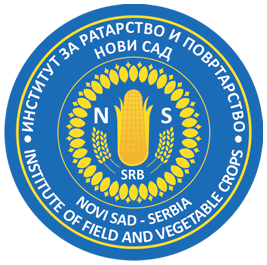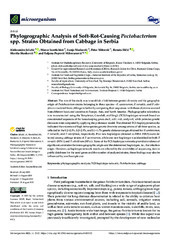Приказ основних података о документу
Phylogeographic Analysis of Soft-Rot-Causing Pectobacterium spp. Strains Obtained from Cabbage in Serbia
| dc.creator | Jelušić, Aleksandra | |
| dc.creator | Scortichini, Marco | |
| dc.creator | Marković, Sanja | |
| dc.creator | Mitrović, Petar | |
| dc.creator | Iličić, Renata | |
| dc.creator | Stanković, Slaviša | |
| dc.creator | Popović Milovanović, Tatjana | |
| dc.date.accessioned | 2023-08-23T11:41:18Z | |
| dc.date.available | 2023-08-23T11:41:18Z | |
| dc.date.issued | 2023 | |
| dc.identifier.issn | 2076-2607 | |
| dc.identifier.uri | http://fiver.ifvcns.rs/handle/123456789/3737 | |
| dc.description.abstract | The aim of this study was to establish a link between genetic diversity and the geographic origin of Pectobacterium strains belonging to three species—P. carotovorum, P. versatile, and P. odoriferum—isolated from cabbage in Serbia by comparing their sequences with those of strains sourced from different hosts and countries in Europe, Asia, and North America. Phylogeographic relatedness was reconstructed using the Templeton, Crandall, and Sing’s (TCS) haplotype network based on concatenated sequences of the housekeeping genes dnaX, icdA, mdh, and proA, while pairwise genetic distances were computed by applying the p-distance model. The obtained TCS haplotype networks indicated the existence of high intra-species genetic diversity among strains of all three species, as reflected in the 0.2–2.3%, 0.2–2.5%, and 0.1–1.7% genetic distance ranges obtained for P. carotovorum, P. versatile, and P. odoriferum, respectively. Five new haplotypes (denoted as HPc1–HPc5) were detected among cabbage strains of P. carotovorum, while one new haplotype was identified for both P. versatile (HPv1) and P. odoriferum (HPo1). None of the TCS haplotype networks provided evidence of significant correlation between geographic origin and the determined haplotypes, i.e., the infection origin. However, as haplotype network results are affected by the availability of sequencing data in public databases for the used genes and the number of analyzed strains, these findings may also be influenced by small sample size. | sr |
| dc.language.iso | en | sr |
| dc.publisher | Basel : MDPI | sr |
| dc.relation | info:eu-repo/grantAgreement/MESTD/inst-2020/200053/RS// | sr |
| dc.relation | info:eu-repo/grantAgreement/MESTD/inst-2020/200032/RS// | sr |
| dc.relation | info:eu-repo/grantAgreement/MESTD/inst-2020/200117/RS// | sr |
| dc.relation | info:eu-repo/grantAgreement/MESTD/inst-2020/200178/RS// | sr |
| dc.relation | info:eu-repo/grantAgreement/MESTD/inst-2020/200010/RS// | sr |
| dc.rights | openAccess | sr |
| dc.rights.uri | https://creativecommons.org/licenses/by/4.0/ | |
| dc.source | Microorganisms - Basel | sr |
| dc.subject | phylogeographic analysis | sr |
| dc.subject | TCS haplotype network | sr |
| dc.subject | Pectobacterium | sr |
| dc.subject | cabbage | sr |
| dc.title | Phylogeographic Analysis of Soft-Rot-Causing Pectobacterium spp. Strains Obtained from Cabbage in Serbia | sr |
| dc.type | article | sr |
| dc.rights.license | BY | sr |
| dc.citation.issue | 8 | |
| dc.citation.rank | M22~ | |
| dc.citation.spage | 2122 | |
| dc.citation.volume | 11 | |
| dc.identifier.doi | 10.3390/microorganisms11082122 | |
| dc.identifier.fulltext | http://fiver.ifvcns.rs/bitstream/id/9572/microorganisms-11-02122.pdf | |
| dc.identifier.scopus | 2-s2.0-85169069147 | |
| dc.type.version | publishedVersion | sr |


